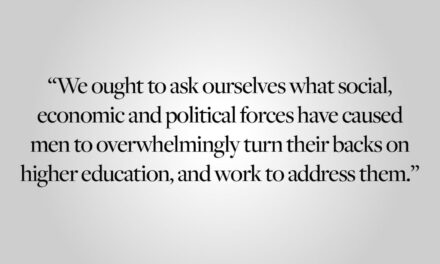IAN HERBERT: For women’s football to mature, it must recognise that elite sport is a world of darkness and light
- Lauren James was sent off against Nigeria for deliberately treading on a player
- Women’s football must see that competitive sport is a mix of darkness and light
- Pressure cannot be separated out from the sport, like some kind of extraneous factor
It was some distance England travelled in the space of 48 hours.
On Saturday evening here, amid the isolation of the spruce pines and lagoons of their media centre in north Sydney, the players were relating how they’d formed a girl band called the Meringue-tangs, belting out numbers by Whitney Houston, Natasha Bedingfield and Natalie Imbruglia.
By Monday evening, Lauren James was being sent from the field in Brisbane for deliberately treading on a player who was lying on the pitch.
Some would say they prefer the meringue form of England — reasonably arguing that deliberately treading on an opponent is not the work of a role model. But the trouble with too much meringue is that it becomes saccharine and sickly, altogether too sweet.
Somewhere along the road to maturity, women’s football faces a reckoning with the fact that competitive sport is a world of darkness and light, not all sweetness and light — in which combustibility, misdemeanours and, yes, bad behaviour will play a part.
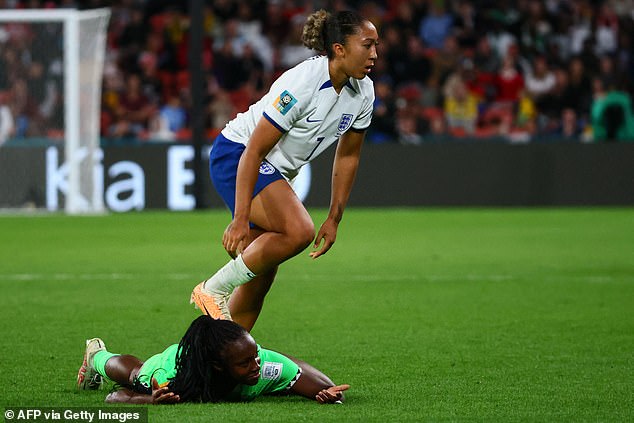
The prevailing image of unremitting niceness won’t build the fascination and drama in a women’s game which this World Cup has revealed is growing. The performers in sport are the ones for whom winning is an obsession. For them, it just can’t be a tea party.
Stepping on to a player’s back in a moment of red mist is in no way welcome. But at least this player cared with a passion about the way a shapeless, foggy-minded England were sinking against Nigeria.
Wasn’t there something slightly life affirming about someone shattering the shiny surface veneer of a team who have been PR’d to death?
James is so prodigious that her profile has been fiercely protected but there is evidence that she has very human complexities. Her mentor at Manchester United, Casey Stoney, has described how she spent time researching youth psychology to help her find her way. ‘I had to learn a lot to make sure I could manage her in certain ways,’ said Stoney. ‘If she fell off track, try to put her on the right track again.’
It is patently clear that James is a restive soul, who has continually challenged her environment. She is 21 yet has already been on the books of Chelsea (twice), Arsenal and Manchester United. The level of investment and professionalism was simply not acceptable to her at United.
None of this renders any of the nonsense which has been offered up in James’s defence by her team-mates at all valid.
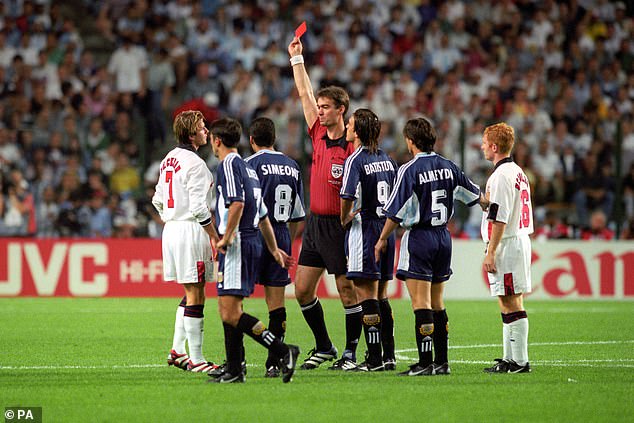
Most of them seem to be suggesting that she should take no blame for her dismissal — removing the team’s only meaningful attacking threat from at least one game and quite possibly three, were they to reach the final — because ‘the pressure’ got to her. Isn’t the entire point of elite sport to test a competitor under pressure — and most especially when carefully laid plans are not working, as was the case when England played Nigeria?
Pressure cannot be separated out from the sport, like some kind of extraneous factor. Chloe Kelly faced pressure when asked to take the decisive last penalty kick and when presented with a goalscoring chance to clinch the European Championship last summer. She managed just fine.
Sarina Wiegman said that James was devastated and will learn from the experience, which is surely true. But that’s not to say that England would be best served by a James who does not play on the edge, never in trouble, in the years ahead.
David Beckham and Wayne Rooney were also contrite after their World Cup dismissals in the France tournament of 1998 and Germany 2006. But there was always something of the night about them — and they didn’t do so badly.
Beckham says he sobbed uncontrollably after the events of that evening in Saint Etienne, yet two years later he was sent off for Manchester United at the Club World Cup, for leaving his studs in on a player during a match against Mexican club Necaxa.
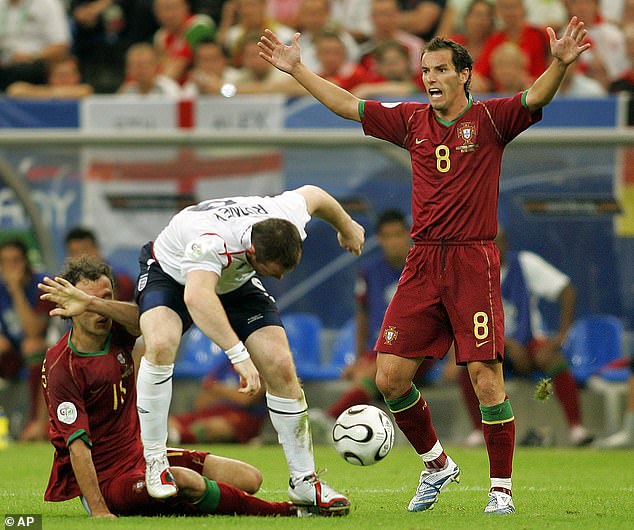
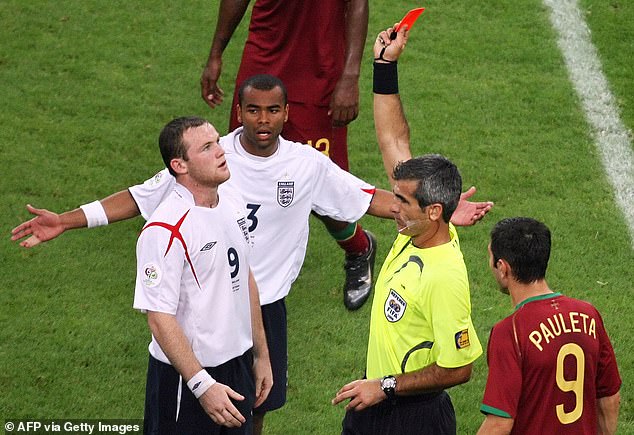
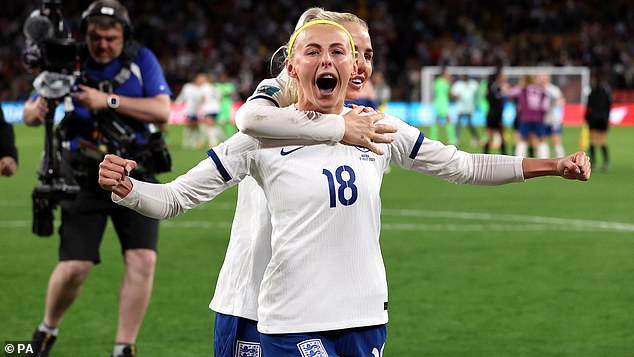
And Rooney? Take your pick of any number of his ensuing misdemeanours after his own dark night of the soul in Gelsenkirchen.
The point Sir Alex Ferguson always made about Rooney was that he would not be the same player if he lost some of that devilment. It did ebb away slightly towards the end of his career. He was the poorer for it.
The next days will be tougher for James than either of these men because she, unlike them, has not been exposed to the kind of spotlight which flows from dismissal in a World Cup knockout game.
No one will want to say that such conduct is in her nature but better that it is than she conforms to the description of her that Wiegman offered in the aftermath.
James, the manager said, was ‘the sweetest person I know’. You really rather hope that’s not the case. The sweetest people don’t tend to lift World Cups.
Why banning fans won’t stop vile tragedy chants
The Crown Prosecution Service’s legal guidance on what has become known as ‘tragedy chanting’, published this week, says that it can be viewed as a public order offence, for which fans can be banned.
Good luck policing that. What constitutes a ‘tragedy’? And how do you police large groups of offenders? The only way this stops is from within, with the majority refusing to tolerate it. It means Liverpool fans challenging those who sing about Munich. And United fans refusing to tolerate Hillsborough hate.
To sing about a rival’s tragedy is to debase the memory of the victims of your own. That must be the message. Treating others as you would want to be treated after incalculable loss does not seem too much to ask. Even in football’s parallel universe.
Mini-Mead is England’s lucky charm
The World Cup issue figurine of England’s Beth Mead kindly sent my way by McDonald’s arrived after I had left for Australia to cover the tournament.
It was intended for my granddaughter, though I fear it might scare her to death. ‘A bit grotesque,’ is how my wife described it when sending the picture. Beth’s feet are still encased in the cardboard packaging, which doesn’t help the overall effect, but from afar I’m rather attached to it, not least because of the eccentricity, always welcome amid the relentless polish of the women’s game.
Mead is injured and not in England’s squad but my colleague Kathryn Batte produced hers as a lucky charm when the round of 16 went to penalties. And it worked. The three-inch Beth will remain a part of our lives for some time, though I suspect she may not be enough to bring the trophy home.
Host nation could be chosen better for viewing
Australia could not have done more to deck its host cities out for the Women’s World Cup and there is a deep national attachment to the home nation team but the absence of travelling supporters is unmistakable. The English and Colombians here in numbers are largely expats.
The viewing figures will no doubt stack up, but it’s hard not to feel that the momentum of the women’s game would be better served by a host nation with less challenging time zones for Europe and the US.


